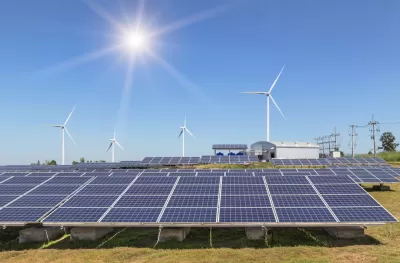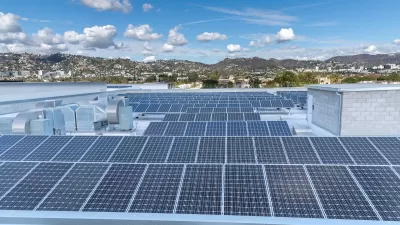Renewable energy enjoys broad public support—the utility industry is more skeptical.

Cities, counties, states, and large corporations are pledging, and in some cases already achieving, 100 percent renewable energy. New market research show that renewable energy is a "public relations juggernaut."
"The rapid spread and evident popularity of the 100 percent [renewable energy] target has created an alarming situation for power utilities," according to an article by David Roberts. "Suffice to say, while there are some visionary utilities in the country, as an industry, they tend to be extremely small-c conservative."
With so many customers demanding to transition to 100 percent renewable energy, Roberts says utilities have reasons for resisting change. "For one thing, most of them don’t believe the technology exists to make 100 percent work reliably; they believe that even with lots of storage, variable renewables will need to be balanced out by 'dispatchable' power plants like natural gas. For another thing, getting to 100 percent quickly would mean lots of 'stranded assets,' i.e., shutting down profitable fossil fuel power plants."
Roberts breaks down the recent market research that shows overwhelming support for renewables from the public, despite the concerns of utilities. A shockingly unified "messaging landscape" emerges, especially considering how many political and media figures still deny that humans cause climate change.
FULL STORY: Utilities have a problem: the public wants 100% renewable energy, and quick

Alabama: Trump Terminates Settlements for Black Communities Harmed By Raw Sewage
Trump deemed the landmark civil rights agreement “illegal DEI and environmental justice policy.”

Planetizen Federal Action Tracker
A weekly monitor of how Trump’s orders and actions are impacting planners and planning in America.

The 120 Year Old Tiny Home Villages That Sheltered San Francisco’s Earthquake Refugees
More than a century ago, San Francisco mobilized to house thousands of residents displaced by the 1906 earthquake. Could their strategy offer a model for the present?

In Both Crashes and Crime, Public Transportation is Far Safer than Driving
Contrary to popular assumptions, public transportation has far lower crash and crime rates than automobile travel. For safer communities, improve and encourage transit travel.

Report: Zoning Reforms Should Complement Nashville’s Ambitious Transit Plan
Without reform, restrictive zoning codes will limit the impact of the city’s planned transit expansion and could exclude some of the residents who depend on transit the most.

Judge Orders Release of Frozen IRA, IIJA Funding
The decision is a victory for environmental groups who charged that freezing funds for critical infrastructure and disaster response programs caused “real and irreparable harm” to communities.
Urban Design for Planners 1: Software Tools
This six-course series explores essential urban design concepts using open source software and equips planners with the tools they need to participate fully in the urban design process.
Planning for Universal Design
Learn the tools for implementing Universal Design in planning regulations.
Clanton & Associates, Inc.
Jessamine County Fiscal Court
Institute for Housing and Urban Development Studies (IHS)
City of Grandview
Harvard GSD Executive Education
Toledo-Lucas County Plan Commissions
Salt Lake City
NYU Wagner Graduate School of Public Service





























